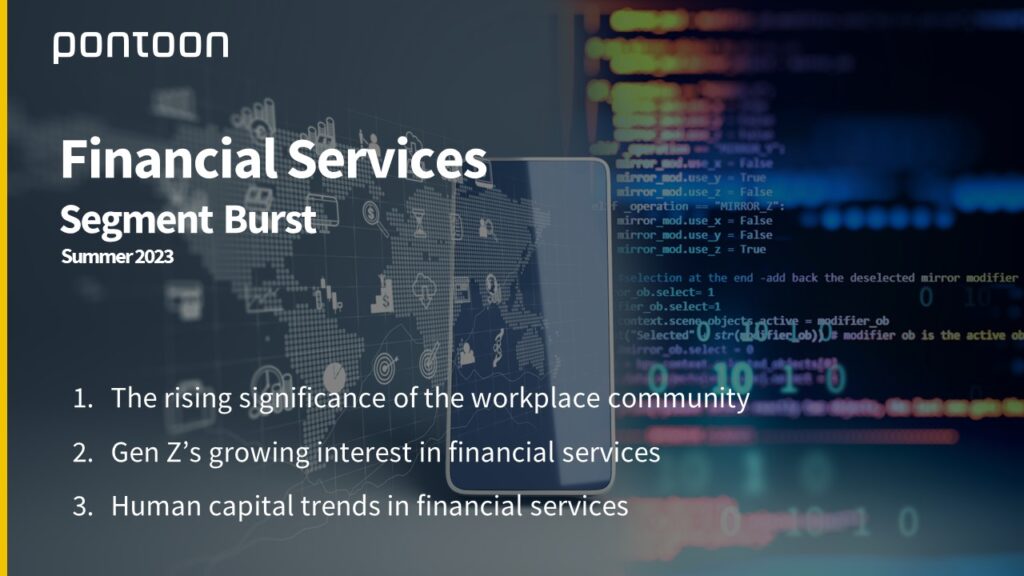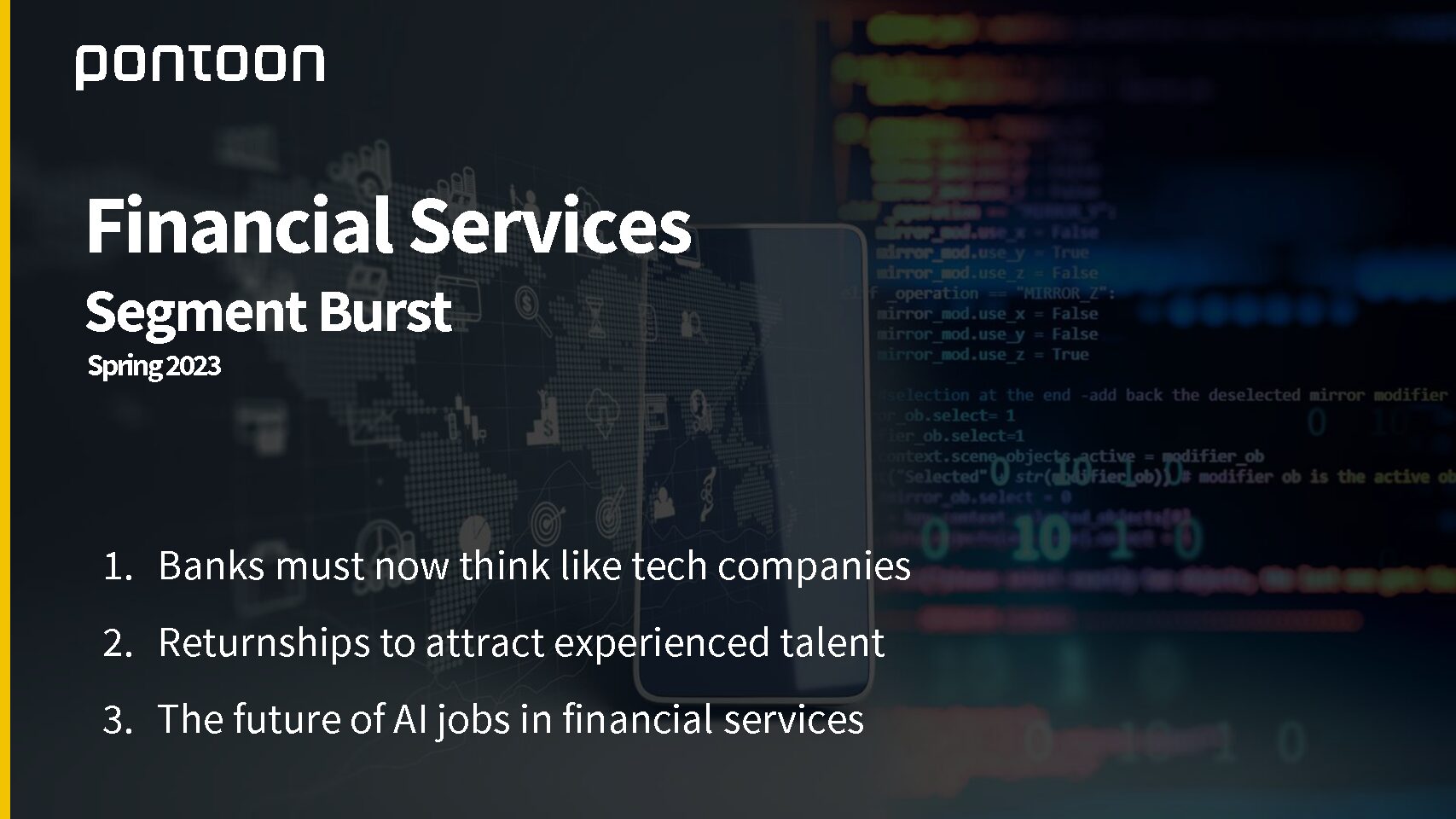Financial Services Segment Burst: Summer 2023
Research
.
In the Summer 2023 Financial Services Segment Burst, we explore the most recent trends in the financial services sector including:
- The rising significance of the workplace community
- Gen Z’s growing interest in financial services
- Human capital trends in financial services
The rising significance of the workplace community
Creating a sense of community within the financial service workplace is essential for fostering employee engagement, satisfaction, and overall well-being. 80% of people in the financial industry want to experience a sense of belonging at their workplace – they view it as a thriving community of individual contributors. However, workers cannot establish meaningful connections with their organisations, which leads to retention challenges.
6 in 10 financial services CFOs have expressed their intention to make remote work a long-term arrangement for a portion of their workforce. To help bridge the connection gap between employees working 100% remotely and location-dependent staff, employers must prioritise initiatives that encourage digital connection and inclusivity, offering a sense of belonging to all staff regardless of work location.
Employers should provide opportunities for employees to engage in online team-building activities, social events, and volunteer initiatives that promote a sense of shared purpose and connection.
Additionally, leveraging technology and digital platforms can facilitate virtual interactions and enhance connectivity, particularly for remote or geographically dispersed employees. Creating online forums, chat groups, or virtual “water cooler” spaces allows workers to connect, share ideas, and build relationships regardless of physical proximity.
Leadership plays a crucial role in fostering a sense of community as well. Encouraging managers to actively engage with their teams, promote inclusivity, and provide mentorship and support can help employees feel valued and connected to the organisation’s mission.
Gen Z’s growing interest in financial services
As the future of work continues to evolve, cultivating young talent in the finance sector becomes increasingly important. The perception of stability, coupled with the allure of the financial industry’s potential for growth, makes it an attractive choice for those just entering the job market or new to the industry.
A recent global report from the CFA Institute reveals that among young adults aged 18-25, the finance sector emerges as the top choice for employment regarding desirability and stability. Surprisingly, finance outshines even highly sought-after fields like technology, healthcare, and education. The industry’s organisations must recognise the appeal of finance among young talent and capitalise on this new trend to attract and retain the best workers.
Organisations must proactively engage with young talent, understand their aspirations and values, and create an environment that nurtures workers’ growth and success as the finance sector thrives as a desirable and stable career choice.
Financial firms are strategically investing more time and resources in campus recruiting to stand out among competitors. For example, companies like JPMorgan Chase are hosting online job fairs and organising on-campus events to engage students directly. Platforms like Handshake, a networking platform for college students, have observed a substantial increase in applications for full-time finance positions.
Employers are also targeting talented tech-focused candidates who may have been impacted by layoffs or hiring freezes in the tech industry, effectively scooping up valuable talent now available.
Establishing connections with tech-focused organisations, industry associations, and professional networks allows financial services companies to tap into the talent pool and gain access to top tech professionals. Building partnerships with coding boot camps, tech meetups, and online communities can further facilitate identifying and recruiting skilled individuals.
Human capital trends in financial services
The financial services industry is experiencing a significant transformation, impacting how organisations engage with their workforce. Trending research from Deloitte shows that the rules of engagement between workers and financial services companies are shifting. Workers want increased flexibility in their roles.
65% of financial services workers prefer a hybrid work arrangement, combining remote and in-person work. Companies must adapt talent management strategies to meet these expectations and create an inclusive and empowering workplace culture.
Another significant focus for financial services leaders is diversity, equity, and inclusion (DEI). To attract and retain top talent, employers should actively promote diversity in their recruitment efforts, implement inclusive policies and practices, and provide training on unconscious bias and cultural awareness.
Finally, there is an immediate need for upskilling and reskilling initiatives to address digital skill gaps in the industry. With technological advancements and recent AI integrations, financial services workers must continuously develop their skills to remain relevant.
82% of organisations prioritise upskilling and reskilling as a pivotal strategy to foster future talent development. Employers should invest in robust learning programmes, offer mentorship opportunities, and encourage a growth mindset among their employees.
In short, employers need to consider the following actions when attracting and retaining top financial talent:
- Foster a culture of continuous learning: Encourage workers to commit to lifelong learning and provide them with resources to acquire new skills and knowledge.
- Prioritise employee well-being: Implement initiatives that support work-life balance, mental health, and overall well-being to enhance productivity and retention.
- Embrace digital transformation: Invest in customer relationship management (CRM) software, AI technologies and upskill workers, empowering them to embrace the evolving digital landscape.
- Promote diversity and inclusion: Create a diverse and inclusive workplace culture where all workers feel valued, respected, and empowered to contribute their unique perspectives.
- Develop agile talent strategies: Adopt flexible work models, leverage remote work capabilities, and embrace workforce agility to attract and retain top talent.
By implementing these recommendations, financial services organisations can adapt to the evolving talent landscape, improve employee engagement, and drive sustainable business success.
Related Post
In the Spring 2023 Financial Services Segment Burst, we explore the most recent trends in the financial services sector including:
Why banks must now think and act like tech companies ...





